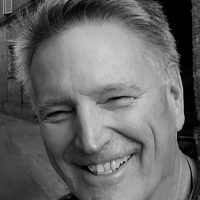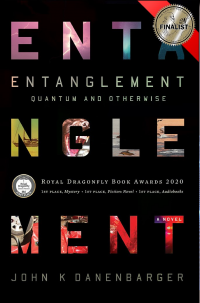John K Danenbarger Interview Published on: 16, Jun 2022
 Tell us a little bit about yourself and your life growing up.
Tell us a little bit about yourself and your life growing up.
I was born in Atlanta, but grew up in small-town Kansas. I was extremely lucky to have parents who read and English teachers who cared and were motivating with their demands.
How did you first get into writing?Writing fascinated me from a young school age and was only enforced by my parents and the above-mentioned teachers. I was never willing to go hungry to become a full-time novelist, and, thus did not begin writing novels until I retired.
In what ways do you think a degree in English and Creative Writing has helped you in your writing career?My degree from Kansas University was simply a further inspiration and confirmation of what made me happy. Then, because I had that education and could write and speak well for myself, I always made a positive impression on those who needed impressing.
Who is the most supportive person in your life when it comes to your writing?My wife, no doubt. She not only respected my time, but was my best critic.
How did you come up with the idea of "Entanglement-Quantum and Otherwise"?The idea for the novel sprang from a single moment as I stood before a wall of family portraits, ranging back to the invention of the camera, that I had hung on a large wall. What struck me (the hardest) was the idea that all these people were dead and I knew little to nothing about each of them.
Were there some alternate endings you considered while writing your first book?Well, that is not something that I can easily answer since I wrote and rewrote every word and chapter.
What do you do when you start doubting your book’s plot-line but are in so deep you can’t change much of it?Since the novel wrote itself, that is, it was not plot driven, but character driven, I had very few doubts. What I doubted most was the phraseology of each sentence and each chapter.
When creating a character do you tend to focus more on their physical attributes or characteristic traits (like their personality, intelligence, background, etc)?I focus completely on their character traits.
With how many ideas do you start writing a novel?Not sure what the meaning of the question might be. I never counted ideas.
Have you ever thought of making one of your books into a movie?I definitely thought about it as comments in reviews came in that direction, especially as a possible TV series. I even studied movie and TV-series material, only to come to the conclusion that I would be wasting my time as a nobody trying to get the attention of an industry that I knew little about. It is just as hard or harder to get anyone to make a movie or TV series as to find a publisher. On top of that my publicist offered to find me a publisher for my next novel, so why was I going in another direction?
What is something no one tells you about writing a novel?I found plenty of advice about how difficult one or another process is. No surprises there.
Do you think that in all cases, hard work can beat talent?No, I do not think hard work can beat talent in all cases. I am sure junk novels or even non-fiction novels might be produced with hard work and little talent if one uses good editors.
Who is your target audience? What are some things you wish your readers would take away from your books?Oh, boy. Now you have struck a nerve. My novel is literary fiction, or maybe even literary crime fiction with some science fiction and some fantasy (according to reviewers). But, basically just literary fiction. This genre is the poorest selling, least money-making book publishing genre. It really only has success when some major critic praises a novel and, then and only then, it may make money for the publisher and/or the author. The reasons are several, but mainly it has to do with the size of the audience. Educated readers who like a challenging story are in a minority. They (and I) only search for books in the major publications and prestigious contests. I have one-hundred and forty-two worldwide reviews so far with seventy five-star reviews (average total 4.6 stars). I have found that more people outside the USA read and like my book, which can be taken in many ways. But, no matter what, sales will never make up for what it cost me to publish. One reviewer said, he, as an English teacher, would use my novel as an example of a great American novel. If that ever happens, it will be after I am dead.
What I would like readers to take away is the thrill of reading good literature, i.e. an unpredictable and thought-provoking saga of interesting characters.
What are your plans for the future as a writer? Are you working on anything new?I am working on another novel, but it takes me years to finish.
When did you first come across the AllAuthor website and what were your expectations coming in? What are your thoughts now?I have not put a huge amount of thought about AllAuthor. I continue using it because I want a drip, drip, drip to remind people of my novel.
Share John K Danenbarger's interview
John K Danenbarger was born in Atlanta but grew up in small-town Kansas. Writing fascinated him from a young age. He studied for and received a merchant marine captain’s license, and sailed the Atlantic between Maine and Bermuda. He established the Salem Massachusetts Writers' Club. He enjoys traveling, ocean sailing, reading, and sometimes his cats.


